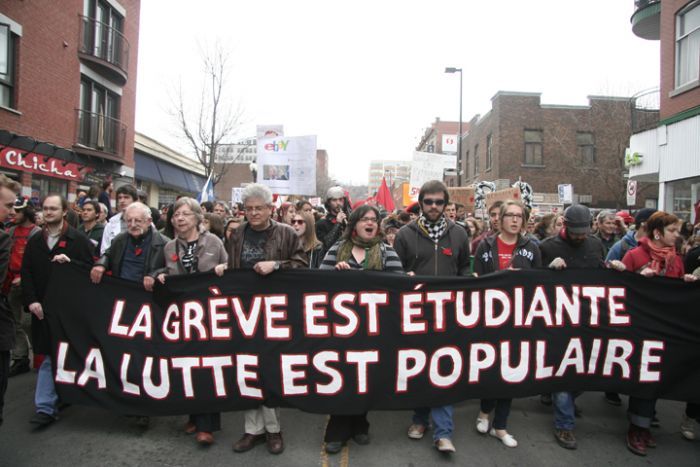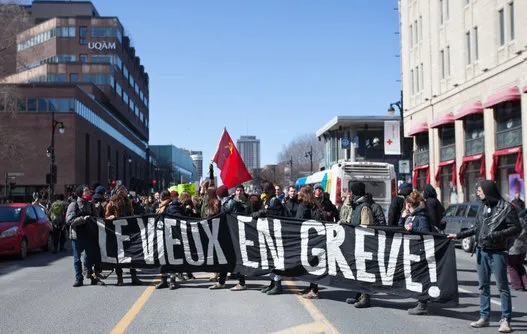
WHY STRIKE? 2024 EDITION

Contents
- WHAT IS A STUDENT STRIKE?
- WHY IS A STUDENT STRIKE EFFECTIVE?
- HOW DOES A STRIKE START?
- HOW DO I WRITE A STRIKE MOTION?
- WHAT’S THE HISTORY OF STUDENT STRIKES IN QUEBEC?
- THE 2023-2024 CONTEXT
- ADDITIONAL RESOURCES
WHAT IS A STUDENT STRIKE?
A student strike is a disruption of university activities: no classes, exams, or evaluations are to take place during a strike. Strikes are enforced through picket lines. Picket lines can either take a “soft-picket” approach (announcing that class is cancelled because of the strike and encouraging students and faculty to leave) or a “hard-picket” (physically blocking the classroom door so that students and faculty are unable to enter). Students can vote for a definite strike, where classes are blocked for a specific length of time, or for an unlimited strike, where classes are indefinitely blocked until a demand is met.

WHY IS A STUDENT STRIKE EFFECTIVE?
Since universities and CÉGEPs in Québec are largely state-funded, disrupting the typical cycle of university activities (ultimately delaying or cancelling a semester) directly costs the government money. Even more, if a strike goes on for a long time, it disrupts graduation rates and thus reduces the number of students entering the workforce, which can create a labour shortage felt across the economy.
HOW DOES A STRIKE START?
At the centre of the strike is The General Assembly, a meeting open to a student association’s entire membership. At an assembly, the association’s executives or general members can bring forward a motion about a strike. Then, all attendees are able to discuss the motion, amend it, and vote on it.
Critically, in order for votes to take place, the assembly must reach quorum, meaning that a certain number of members must be present. Quorum ranges from association to association and is usually between 10-20% of the total membership, which can range from a few dozen students to hundreds. Quorum is defined in an association’s constitution.
During a strike, holding frequent general assemblies is important for keeping the strike democratic and keeping students informed. Strikes are usually called by departmental and faculty associations since those smaller associations have smaller quorums and have fewer classes to picket. A campus-wide strike is hard to enforce since it would include hundreds of classes to picket.
So, if you are:
- A STUDENT ASSOCIATION EXECUTIVE
- Find your association’s constitution. Find out what the quorum for your general assemblies are and identify any other articles about general assemblies or strike motions.
- Call a general assembly and publicise it widely among your membership: listservs, social media, posters, class announcements, etc. Serve food if you have the budget!
- Prepare the logistical procedures for your assembly: How are motions submitted and discussed? How is the chair selected? Who is eligible to speak or vote? How are votes collected? Where will the assembly be?
- See more notes here: How to Hold a General Assembly | Toronto 2012 Workshop
- Prepare the strike motion (see section below).
- A MEMBER OF A STUDENT ASSOCIATION
- Reach out to your association’s executive and express your interest in a general assembly on the issue.
- Share these resources with them. Be prepared to argue in favour of the urgency of this issue. If they are resistant to the idea, use the association’s constitution to argue that they are responsible to host the general assembly, in which the membership will make up its own mind, regardless of the executives’ positions. You can also reach out to CSU at csucampaignscoordinator@gmail.com or SSMU at external@ssmu.ca for support or guidance.
HOW DO I WRITE A STRIKE MOTION?
A motion has two components: the “whereas” clauses, which provide reasoning and context for the motion, and the “be it resolved” clauses, where the actionable items are outlined. For example,
- WHEREAS higher tuition fees will burden lower-income out-of-province students attending university in Quebec with increased debt and greater pressure to work during their studies;
- WHEREAS this tuition increase has been imposed without the consent or consultation of student associations;
- WHEREAS the introduction of students from outside Quebec represents a tremendous cultural and intellectual asset for the province, one that addresses the pressing labour shortage;
- WHEREAS this increase in tuition fees will perpetuate elitist and classist barriers in post-secondary education;
- WHEREAS accessible post-secondary education for all is critical to the economic and intellectual flourishing of individuals and society at large;
- WHEREAS higher tuition fees will burden lower-income out-of-province students attending university in Quebec with increased debt and greater pressure to work during their studies;
- BE IT RESOLVED THAT the [XX] Student association declare a 3-day strike from January 31, 2024, to February 2nd, 2024; OR
- BE IT RESOLVED THAT the [XX] Student association declare a 1-day strike on February 2nd, 2024; AND
- BE IT FURTHER RESOLVED THAT the [XX] student association adopt a [soft or hard] picket tactic;
If the association wants to simultaneously adopt positions related to the subject:
- BE IT FURTHER RESOLVED THAT the [XX] student association adopt a position stating that [X]
If the association wants to go on a general strike:
- BE IT RESOLVED THAT the [XX] Student Association shall declare a general strike of indefinite duration, to be initiated [DATE].
If you want the general strike to be renewed regularly:
- BE IT FURTHER RESOLVED THAT the strike must be renewed every five academic days. [XX] Student Association shall hold a special Strike Assembly every week which will vote by simple majority on whether to continue or terminate strike action, with a quorum of [XX]% of the association’s membership.
See more clause samples here: Fuck Austerity Guide to Strikes (2015)
Get ambitious in your initial motion! More radical motions will motivate students to attend the assembly in order to debate it, which helps you reach quorum! Motions can always be amended on the strike floor to be less ambitious.
If members are hesitant, setting a strike floor in your motion (meaning a WHEREAS clause that states a certain # of other associations that must also vote to strike in order for your motion to take effect) can help the strike mandate feel safer and more legitimate. You can also outline within your strike motion how often the strike must be renewed and how striking procedures and picketing will be organised.
WHAT’S THE HISTORY OF STUDENT STRIKES IN QUEBEC?
Since the 1960s, students in Québec have organized around demands concerning access to education, tuition fees, loans and grants, and free education. Striking has proved to be one of the student movement’s most effective pressure tactics. Major strikes have occurred in 1968, 1974, 1978, 1986, 1988, 1990, 1996, 2005, 2012, and 2015. The largest student strike in Québec and Canada’s history took place over six months in 2012, which included over 300,000 students in its peak, about 75% of all CÉGEP and university students in the province. Students today have access to an incredible wealth of knowledge from their predecessors, in the forms of zines, books, films, reports, and more. Check out the bottom of this page for links to some of these resources.
THE 2023 CONTEXT
In October 2023, the Québec government announced a plan to nearly double tuition fees for out-of-province students in fall 2024, raising the minimum cost from $8,992 to $17,000. The Coalition Avenir Québec (CAQ), the current majority government, has framed the tuition hike as a way to protect the French language, including funnelling the increased tuition revenue towards Québec’s French-language universities. However, students have protested that the tuition hike’s greatest effects will instead be to price out poor students, increase student debt, and exacerbate elitism within post-secondary education.
Since the announcement, student associations at McGill, Concordia, and UQAM, among other universities and CÉGEPs, have organised town halls, educational workshops, demonstrations, and a one-day strike to oppose the tuition hike and mobilise a united front of students. Administrators at the three major English-language universities, Bishop’s, McGill, and Concordia, have also publicly opposed the tuition hike, describing the threat it poses to their enrolment and funding given that 30%, 20%, and 9% of their student bodies are out-of-province Candians, respectively. Finally, Liberal MNAs put forward a formal petition opposing the tuition hike in the Assemblée nationale, which received over 33,000 signatures in its month-long signing period.
At Concordia, several student associations have already organised a strike in response to the proposed tuition increase. On November 30, over 1,000 students from the Geography Undergraduate Student Society, The School of Community and Public Affairs Students’ Association, and the Urban Planning Association organised a one-day strike where they picketed classes and joined the inter-university demonstration taking place on that day. Recent news reports have suggested that the Quebec government is now considering a lower fee increase of 33%. Although the student movement is still opposed to this lower increase, this backtracking shows that the government is feeling the pressure from the students and the administrations. The fight continues!


ADDITIONAL RESOURCES
Organize to strike, fight to win! Quebec Student Strike of 2012 Booklet
23 Reasons to Strike Booklet | Free Education Montreal 2011
- Includes answers to questions like: What are my legal rights during a strike? How does a strike affect international students? How does a strike affect graduate students? How does a strike affect internships?
How to Hold a General Assembly | Toronto 2012 Workshop
Brochure “Guess What! We’ve Got Rights!?” | Collective Opposed to Police Brutality
